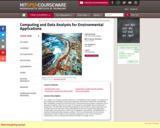
Covers computational and data analysis techniques for environmental engineering applications. First third of subject introduces MATLAB and numerical modeling. Second third emphasizes probabilistic concepts used in data analysis. Final third provides experience with statistical methods for analyzing field and laboratory data. Numerical techniques such as Monte Carlo simulation are used to illustrate the effects of variability and sampling. Concepts are illustrated with environmental examples and data sets. This subject is a computer-oriented introduction to probability and data analysis. It is designed to give students the knowledge and practical experience they need to interpret lab and field data. Basic probability concepts are introduced at the outset because they provide a systematic way to describe uncertainty. They form the basis for the analysis of quantitative data in science and engineering. The MATLABĺ¨ programming language is used to perform virtual experiments and to analyze real-world data sets, many downloaded from the web. Programming applications include display and assessment of data sets, investigation of hypotheses, and identification of possible casual relationships between variables. This is the first semester that two courses, Computing and Data Analysis for Environmental Applications (1.017) and Uncertainty in Engineering (1.010), are being jointly offered and taught as a single course.
- Subject:
- Education
- Engineering
- Environmental Engineering
- Mathematics
- Material Type:
- Full Course
- Provider:
- MIT
- Provider Set:
- MIT OpenCourseWare
- Author:
- McLaughlin, Dennis
- McLaughlin, Dennis B.
- Date Added:
- 01/01/2003


